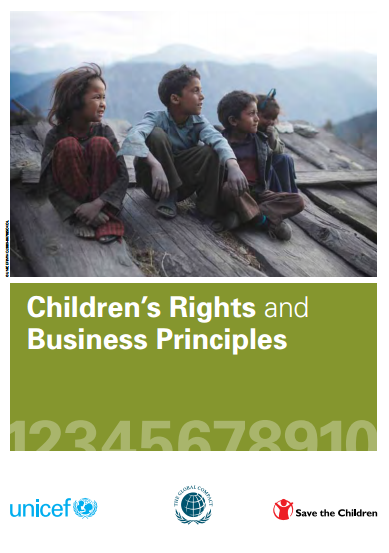
Children’s Rights and Business Principles
Publication Year: -- / Sources: Save the Children, UNICEF and the Global CompactChildren under 18 years old account for almost one third of the world’s population. In many countries, children and youth make up almost one half of the national population. It is inevitable that business, whether small or large, will interact with and have an effect on the lives of children both directly and indirectly.
Download: English | Khmer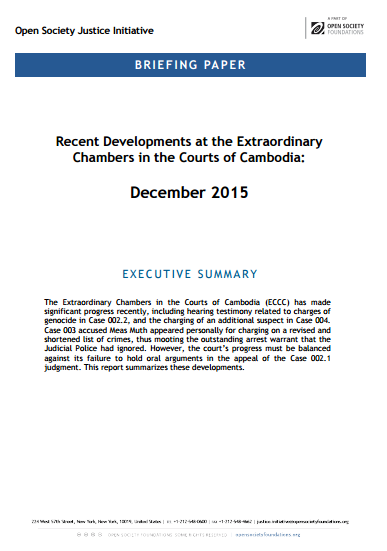
Recent Developments at the Extraordinary Chambers in the Courts of Cambodia
Publication Year: 2015 / Sources: Open Society Justice InitiativeThe Extraordinary Chambers in the Courts of Cambodia (ECCC) has made significant progress recently, including hearing testimony related to charges of genocide in Case 002.2, and the charging of an additional suspect in Case 004. Case 003 accused Meas Muth appeared personally for charging on a revised and shortened list of crimes, thus mooting the outstanding arrest warrant that the Judicial Police had ignored.
Download: English | Khmer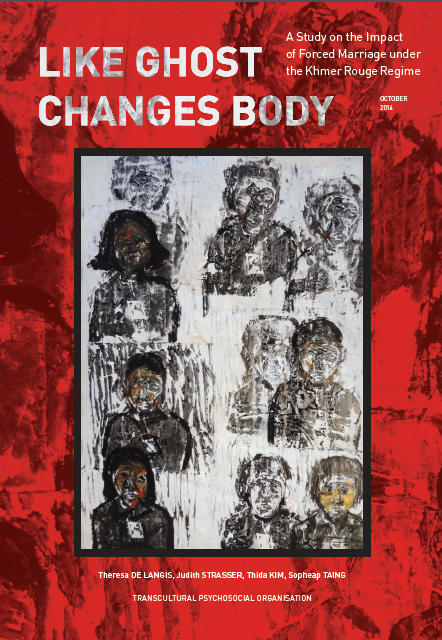
“Like Ghost Changes Body”: A Study on the Impact of Forced Marriage under the Khmer Rouge Regime
Publication Year: 2014 / Sources: Judith Strasser, Transcultural Psychosocial Organization (TPO)Nearly 40 years after the fall of the genocidal Khmer Rouge regime (1975-1979) the forced marriages and enforced conjugal relations experienced by thousands of Cambodians continue to be little understood as a central part of the general atrocity. These marriages eliminated choice, were without consent, and took place within a context of severe coercion. They deprived victims of the basic right to self-determination in a central life decision, and in many cases they resulted in sexual and physical abuse, psychological trauma, economic deprivation, religious exclusion, and social discrimination. The consequences of the Khmer Rouge policy continue until today. (…) The research study is based on interviews with 106 Civil Parties to Case 002 about their experiences of forced marriage under the Khmer Rouge regime.
Download: English | Khmer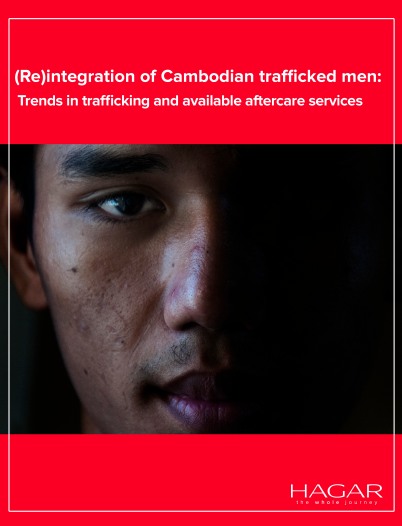
(Re)integration of Cambodian Trafficked Men: Trends in Trafficking and Available Aftercare Services
Publication Year: 2015 / Sources: Hagar CambodiaMen constitute a significant proportion of the identified victims of trafficking in Cambodia. While there is no coordinated database of victim numbers, between 2011 and 2014, males comprised 59 per cent of trafficking victims assisted by the Counter Trafficking in Persons Program Phase II, and more than 88 per cent of those assisted by the International Organization for Migration Cambodia. The aim of this research is to inform service providers who seek to fill the gap in aftercare for men.
Download: English | Khmer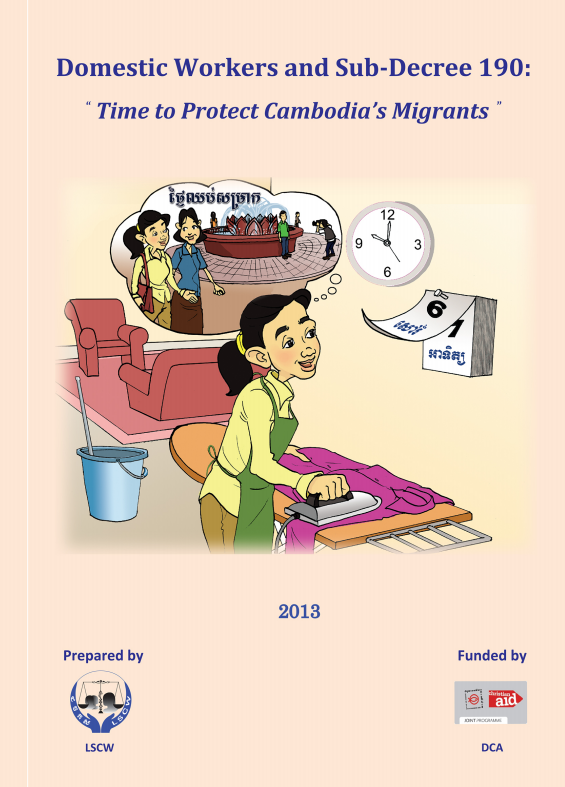
Domestic Workers and Sub-Decree 190: Time to Protect Cambodia’s Migrants
Publication Year: 2013 / Sources: Legal Support for Children and Women (LSCW)On August 17th, 2011, the Royal Government of Cambodia enacted Sub‐Decree #190 on The Management of the Sending of Cambodian Workers Abroad through Private Recruitment Agencies. The Sub‐Decree is a regulation that replaces the previous Sub‐Decree #57 on Sending Khmer Migrants Abroad (1995). The Sub‐decree establishes the Ministry of Labor and Vocational Training (MoLVT) as the authority to grant licenses to Cambodian recruitment agencies to send workers abroad
Download: English | Khmer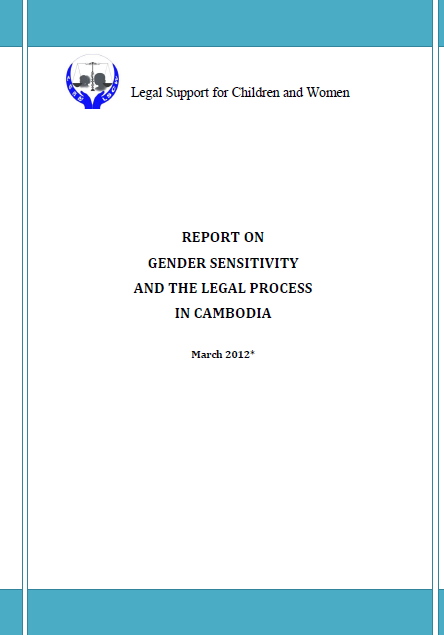
Gender Sensitivity and the Legal Process in Cambodia
Publication Year: 2012 / Sources: Legal Support for Children and Women‘Gender sensitivity’ is the ability to recognize, accept and examine gender issues and concerns. This report considers gender sensitivity particularly towards Victims and Women during the legal process (from initial interviews with Victims and Women through to trial) in Cambodia. It seeks to identify strengths and weaknesses in relation to gender sensitivity during the legal process.
Download: English | Khmer
Gender Discrimination and Advocacy Handbook
Publication Year: -- / Sources: Advocacy and Policy Institute (API)This book is a tool to help people to understand and take advocacy actions against gender discrimination in Cambodia. It looks at ways to advocate for the reduction and elimination of gender discriminatory practices at work and in communities and how we can influence policy change.
Download: English | Khmer
Addressing Local Demand for Commercial Sex with Children in Cambodia
Publication Year: 2010 / Sources: ECPAT CambodiaThis Policy Analysis Exercise (PAE) sheds light on the issue of local demand for commercial sex with children under 18 in Cambodia. Through its findings, this PAE informs current trafficking and commercial sexual exploitation programming in Cambodia and recommends a strategy for ECPAT-Cambodia, the client of this PAE, on how to address local demand for commercial sex with children.
Download: English | Khmer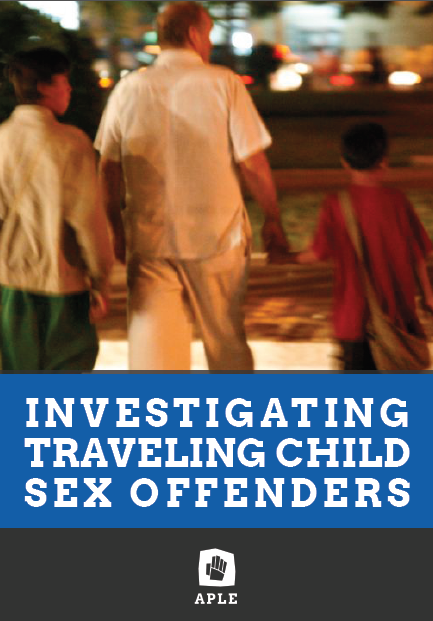
Investigating Travelling Child Sex Offenders
Publication Year: 2014 / Sources: Action Pour Les Enfants (APLE) CambodiaIn the period 2003-2013, APLE investigations resulted in 288 arrests. Detailed information has been collected about the offenders, victims, and the legal process in each case. All data has been analysed and APLE staff members were consulted to provide their expertise about the topics in question. The objective is to provide substantial knowledge about traveling child sex offenders, victims of child sexual abuse and exploitation, and the legal process in Cambodia.
Download: English | Khmer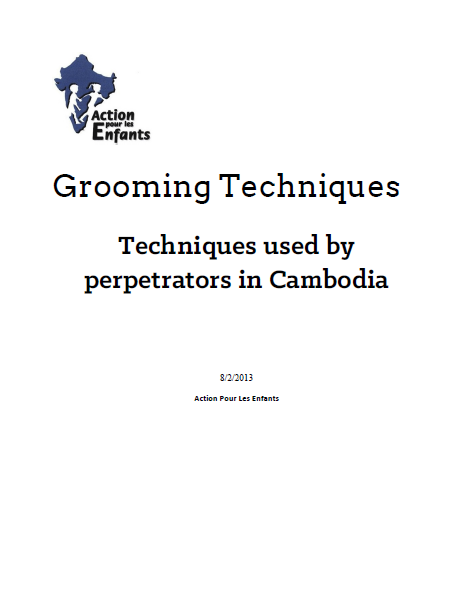
Grooming Techniques: Techniques Used by Perpetrators in Cambodia
Publication Year: 2013 / Sources: Action Pour Les Enfants (APLE) CambodiaA technique often used in street-‐‑based exploitation is grooming. “Grooming”, in this publication, is a term that describes the techniques and behaviors that child sex offenders use to develop a relationship of trust, control and dependence with their victims (and often the victims’ʹ families and communities). Common techniques for travelling child sex offenders are to provide their victims, the victim’s family or the victim’s community with monetary support, food and shelter, gifts, holidays and education.
Download: English | Khmer